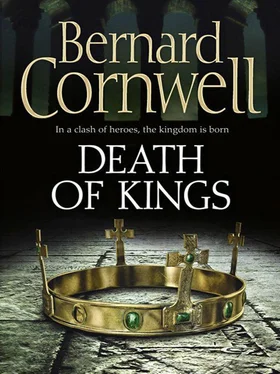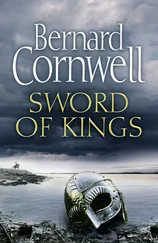He still hesitated, but then, like a millpond’s dam bursting, he told me of the unhappiness in Cent. ‘We were our own kingdom once,’ he said. ‘Now Wessex treats us as runts of the litter. Look what happened when Haesten and Harald landed! Were we protected? No!’
Haesten had landed on Cent’s northern coast while Jarl Harald Bloodhair had brought more than two hundred ships to the southern shore where he had stormed a half-built burh and slaughtered the men inside, then spread across the county in an orgy of burning, killing, enslaving and robbing. Wessex had sent an army led by Æthelred and Edward to oppose the invaders, but the army had done nothing. Æthelred and Edward had placed their men on the great wooded ridge at the centre of Cent and then argued whether to strike north towards Haesten or south towards Harald, and all the while Harald had burned and killed.
‘I killed Harald,’ I said.
‘You did,’ the bishop allowed, ‘but not till after he’d ravaged the county!’
‘So men want Cent to be its own kingdom again?’ I asked.
He hesitated a long time before answering, and even then he was evasive. ‘No one wanted that while Alfred lived,’ he said, ‘but now?’
I stood and walked to a window from where I could stare down at the wharves. Gulls screamed and wheeled in the summer sky. There were two cranes on the wharf and they were lifting horses into a wide-bellied trading ship. The ship’s hold had been divided into stalls where the frightened beasts were being tethered. ‘Where are the horses going?’ I asked.
‘Horses?’ Swithwulf asked, puzzled, then realised why I had asked the unexpected question. ‘They send them to market in Frankia. We breed good horses here.’
‘You do?’
‘Ealdorman Sigelf does,’ he said.
‘And Sigelf rules here,’ I said, ‘and his son talks to the Danes.’
The bishop shuddered. ‘So you say,’ he said cautiously.
I turned to him. ‘And his son was in love with your daughter,’ I said, ‘and for that reason hates Edward.’
‘Dear God,’ Swithwulf said quietly and made the sign of the cross. There were tears in his eyes. ‘She was a silly girl, a silly girl, but joyous.’
‘I’m sorry,’ I said.
He blinked away the tears. ‘And you look after my grandchildren?’
‘They’re in my care, yes.’
‘I hear the boy is sickly,’ he sounded anxious.
‘That’s just a rumour,’ I reassured him. ‘They’re both healthy, but it’s better for their health if Ealdorman Æthelhelm believes the contrary.’
‘Æthelhelm’s not a bad man,’ the bishop said grudgingly.
‘But he’d still cut your grandchildren’s throats if he had the chance.’
Swithwulf nodded. ‘What colour do they have?’
‘The boy’s dark like his father, the girl is fair.’
‘Like my daughter,’ he said in a whisper.
‘Who married the ætheling of Wessex,’ I said, ‘who now denies it. And Sigebriht, her rejected lover, went to the Danes out of hatred for Edward.’
‘Yes,’ the bishop said quietly.
‘But then swore an oath to Edward when Æthelwold fled north.’
Swithwulf nodded. ‘I heard.’
‘Can he be trusted?’
The directness of the question unsettled Swithwulf. He frowned and shifted uncomfortably, then gazed through a window to where crows where loud on the grass. ‘I would not trust him,’ he said softly.
‘I couldn’t hear you, bishop.’
‘I would not trust him,’ he said more loudly.
‘But his father is ealdorman here, not Sigebriht.’
‘Sigelf is a difficult man,’ the bishop said, his voice low again, ‘but not a fool.’ He looked at me with unhappy appeal. ‘I’ll deny this conversation,’ he said.
‘Have you heard us having a conversation?’ I asked Finan.
‘Not a word,’ he said.
We stayed that night in Hrofeceastre and next day went back to Lundene on the flooding tide. There was a chill on the water, the first taste of autumn coming, and I rousted my men from the new town’s taverns and saddled horses. I was deliberately staying away from Fagranforda because it was so close to Natangrafum and so I took my small troop south and west along familiar roads until we reached Wintanceaster.
Edward was surprised and pleased to see me. He knew I had not been in Fagranforda for most of the summer so did not ask me about the twins, instead telling me that his sister had sent news of them. ‘They’re well,’ he said. He invited me to a feast. ‘We don’t serve my father’s food,’ he assured me.
‘That’s a blessing, lord,’ I said. Alfred had ever served insipid meals of weak broths and limp vegetables, while Edward, at least, knew the virtues of meat. His new wife was there, plump and pregnant, while her father, Ealdorman Æthelhelm, was plainly Edward’s most trusted counsellor. There were fewer priests than in Alfred’s day, but at least a dozen were at the feast, including my old friend Willibald.
Æthelhelm greeted me jovially. ‘We feared you’d be provoking the Danes,’ he said.
‘Who? Me?’
‘They’re quiet,’ Æthelhelm said, ‘and best not to wake them.’
Edward looked at me. ‘Would you wake them?’ he asked.
‘What I would do, lord,’ I told him, ‘is send a hundred of your best warriors to Cent. Then I’d send another two or three hundred to Mercia and build burhs there.’
‘Cent?’ Æthelhelm asked.
‘Cent is restless,’ I said.
‘They’ve always been troublesome,’ Æthelhelm said dismissively, ‘but they hate the Danes as much as the rest of us.’
‘The Centish fyrd must protect Cent,’ Edward said.
‘And Lord Æthelred can build burhs,’ Æthelhelm declared. ‘If the Danes come we’ll be ready for them, but there’s no point in poking them with a sharp stick. Father Willibald!’
‘Lord?’ Willibald half stood at one of the lower tables.
‘Have we heard from our missionaries?’
‘We will, lord!’ Willibald said, ‘I’m sure we will.’
‘Missionaries?’ I asked.
‘Among the Danes,’ Edward said. ‘We will convert them.’
‘We shall beat Danish swords into ploughshares,’ Willibald said, and it was just after those hopeful words were said that a messenger arrived. He was a mud-spattered priest who had come from Mercia, and he had been sent to Wessex by Werferth, who was the Bishop of Wygraceaster. The man had plainly ridden hard and there was a hush in the hall as we waited to hear his news. Edward raised a hand and the harpist lifted his fingers from the strings.
‘Lord,’ the priest went on his knees before the dais on which the high table was bright with candles, ‘great news, lord King.’
‘Æthelwold’s dead?’ Edward asked.
‘God is great!’ the priest said. ‘The age of miracles is not over!’
‘Miracles?’ I asked.
‘It seems there is an ancient tomb, lord,’ the priest explained, looking up at Edward, ‘a tomb in Mercia, and angels have appeared there to foretell the future. Britain will be Christian! You will rule from sea to sea, lord! There are angels! And they have brought the prophecy from heaven!’
There was a sudden spate of questions that Edward silenced. Instead he and Æthelhelm questioned the man, learning that Bishop Werferth had sent trusted priests to the ancient tomb and they had confirmed the heavenly visitation. The messenger could not contain his joy. ‘The angels say the Danes will turn to Christ, lord, and you shall rule one kingdom of all the Angelcynn!’
‘You see?’ Father Coenwulf, who had survived being locked in a stable on the night he had gone to pray with Æthelwold, could not resist the temptation to be triumphant. He was looking at me. ‘You see, Lord Uhtred! The age of miracles is not over!’
Читать дальше
Конец ознакомительного отрывка
Купить книгу












